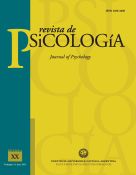Theoretical contributions of cognitive psychology to build a new scientific economy
Keywords:
Rationality, Cognitive psychology, Adam Smith, Daniel Kanheman, Amos Tversky, Prospect theory.Abstract
This theoretical essay aims to review the conceptions of the subject of one of the theoretical political economy systems that have had the greatest influence up to the present. The father of liberalism (Adam Smith) sustained a theory of Cartesian subject (modern), i.e., a true rational and self-conscious sapiens sapiens. Through cognitive psychology, the Nobel Prize in economics Kahneman and Tversky have a new variant of homoeconomicus, enriched with contributions of experimental science, substantially changing that old conception of man as a rational being that marked almost all thought modern. Given these “recent reviews” theoretical-methodological, engendered in the light of the so-called science of the mind, is that it is essential to rethink old notions of subject that it served as the foundation to the economic and political system, mentioned before. To this end, it is proposed to carry out a theoretical-methodological synergy between two scientific disciplines: economics and psychology. This syncretism could provide the basis for a new integrative scientific discipline, which many theorists have called neuro-economics. That is why, in the present work intends to make an informed a criticism based of a current economic theories, with main emphasis on the psychological and anthropological assumptions. Finally, it try to re-think a new model of homo economicus, articulating the main assumptions of the current economy with some of the contributions of cognitive psychology, biology and cognitive neuroscience, which results in a new paradigm called integrative psycho-neuro-economics.
Downloads
References
Azcoaga, J. (1984). Aprendizaje fisiológico y aprendizaje pedagógico. Buenos Aires, Argentina: El Ateneo.
Ballesteros, J.S. (1995). Psicología general. Un enfoque cognitivo (2ª ed.). Madrid, España: Editorial Universitas.
Brunet, I. & Pastor, I. (2001). La axiomática de la ciencia económica convencional. Política y Sociedad, 37, 161-179.
Dawkins, R. (1993) El gen egoísta. Las bases biológicas de nuestra conducta. Barcelona. España: Biblioteca Científica Salvat.
D’elía, V. (2009). El sujeto económico y la racionalidad de Adam Smith. Revista de Economía Institucional, 2 (21), 37-43.
Eisenberg, L. (1998). Naturaleza, entorno y crianza. El papel de la experiencia social en la transformación del genotipo en fenotipo. Revista Academia Psychiatry,22, 213-222.
Frenquelli, R. (1992). Estructura biológica del sujeto II. Psicofisiología. Rosario, Argentina: Facultad de Psicología (UNR).
Gardner, H. (1988). La nueva ciencia de la mente. Barcelona, España: Paidós.
Goldberg, E. (2002). El cerebro ejecutivo: lóbulos frontales y mente civilizada. Barcelona, España: Crítica
Johnson-Laird, P.N. (1990). El ordenador y la mente. Introducción a la ciencia cognitiva. Barcelona, España: Paidós.
Kahneman, D. (2012). Pensar rápido, pensar despacio. Madrid, España: Debate.
Kral, V.A. & MacLean, Paul D. (1973). A Triune concept of the brain and behavior. Ontario Mental Health Foundation. EE. UU.: University of Toronto Press.
Luria, A. (1982). Las funciones corticales superiores del hombre. La Habana, Cuba: Ministerio de Cultura. Editorial científico-Técnica.
Maturana, H. & Varela, F. (1999).El árbol de conocimiento. Las bases biológicas del conocimiento humano. Madrid, España: Debate.
Morín, E. (2001) Los siete saberes necesarios para la educación del futuro. Barcelona, España: Paidós.
Newell, A., Rosemblum, P.S. & Laird, J.E. (1989).Symbolic Architecture for Cognition. En M. Posner (Ed.), Foundations of Cognitive Science. Cambridge, EE.UU.: MIT Press.
Pascale, R. (2007). Del hombre de Chicago al hombre de Khaneman y Tversky. Revista Quantum, 2 (1).
Pavlov, I.P. (1997).Los reflejos condicionados. Madrid, España: Morata.
Pérez Soto, C. (2013). Hegel y Marx. Colección Proposiciones.
Raims, D.G. (2004). Principios de neuropsicología humana. México: McGraw Hill.
Smith, A. (1956). Investigación de la naturaleza y causas dela riqueza de las naciones, 1776. Madrid, España: Aguilar
Tirapu-Ustárroz, J., García-Molina, A., Luna-Lario, P., Roig-Rovira, T. & Pelegrín Valero, C. (2008). Modelos de funciones y control ejecutivo (I). Revista de Neurología, 46 (11), 684-692.
Von Newmann, J. (2000). The Computer and the Brain. New Haven, EE.UU.: Yale University Press.
Downloads
Published
How to Cite
Issue
Section
License















